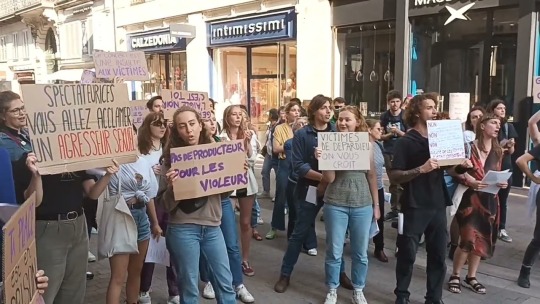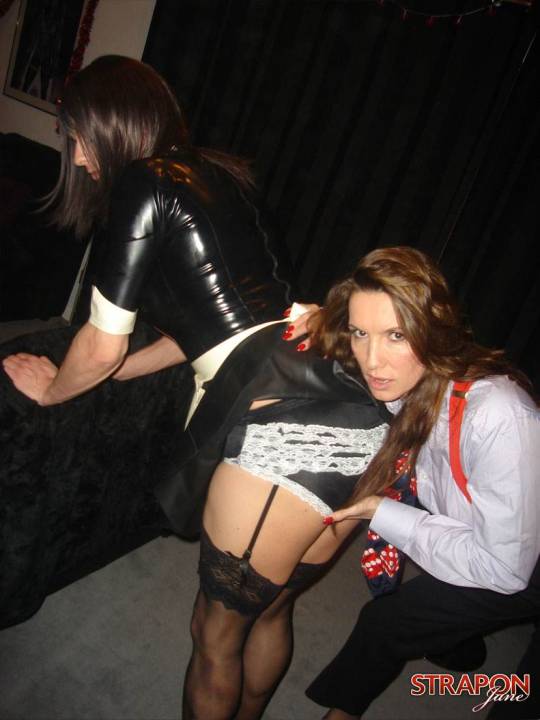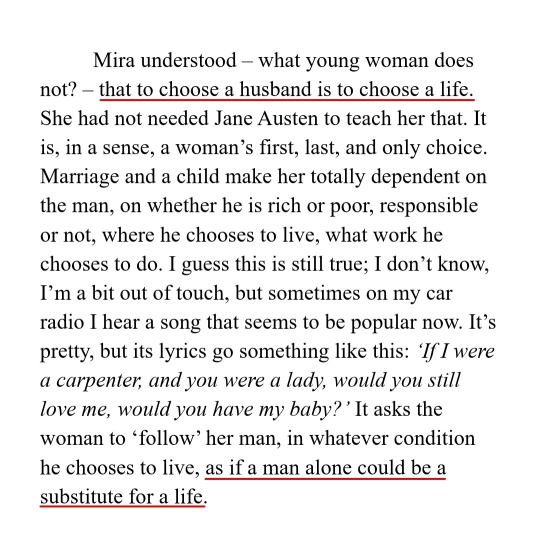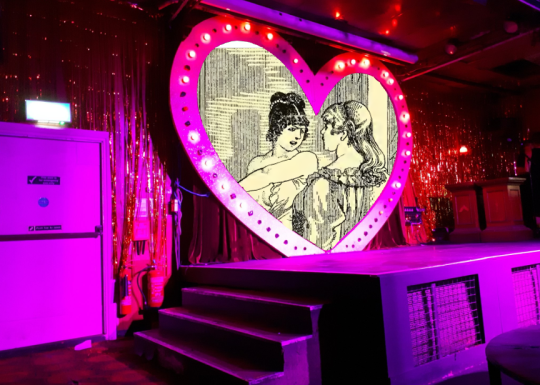#French feminism
Explore tagged Tumblr posts
Text
"A little-known feminist of the seventeenth century, Poulain de la Barre, put it this way: 'All that has been written about women by men should be suspect, for the men are at once judge and party to the lawsuit.'"
Simone de Beauvoir, in her introduction to The Second Sex
#Poulain de la Barre#Simone de Beauvoir#feminism#feminist#feminist quotes#french feminist#french feminism#feminist history#quotes
568 notes
·
View notes
Text

42 notes
·
View notes
Text
Just listened to a podcast on FranceInter about post WW2 feminism.
I've always believed that the right to vote in France, was given to women in 1944 as some kind of part of the package (l'État Providence/welfare state) De Gaulle and his government offered to provide relief to the people post WW2.
The podcoast gives two reasons for it that I didn't know. According to it, the right to vote was given to women:
1. As a reward to women who were part of the Resistance (even though there were very little resistants)
2. Because France was so fucking backwards in terms of women's rights compared to their occidental neighbours (other european countries + USA) that it would have been the only country among their little club where women couldn’t vote, and of course that would make us look bad.
But at zero point, it was because women were recognized or thought equals (despite them managing the country while men were at war).
So yeah, France is the country of men's rights. Men's. Not mankind. No matter how much every one insist that the "h" in front of Droits de l'homme is a capital letter, it's not.
Even in 2024, a female Prime Minister in France is a preposterous concept, meanwhile poorer countries we would call "backwards" have female leaders of states without losing their mind about it.
#rant#radical feminism#men vs women#feminism#france#french politics#french feminism#sexism#misogyny#women's rights#right to vote
4 notes
·
View notes
Text
[Olympe de Gouges] was a Parisian playwright and pamphleteer, an uneducated one who held women’s education dear, and she was very well known. She founded women's clubs and tried to break down the exclusion of women from politics through discussion in these clubs and through her own writing and pamphleteering. As a woman, however, in line with the traditional classification and division of women, and politics, her interests have not often been perceived as political. ‘She was indefatigable in composing appeals for good causes; the abolition of the slave trade, the setting up of public workshops for the unemployed, a national theatre for women’ (Tomalin, 1977, p. 200). What does a woman have to do to be seen as political?
In ‘Nine hundred and Ninety Nine Women of Achievement’ (Chicago, 1979) it is said of Olympe de Gouges that: ‘She demanded equal rights for women before the law, and in all aspects of public and private life. Realizing that the Revolutionaries were enemies of the emancipation of women, she covered the walls of Paris with bulletins - signed with her name - expounding her ideas and exposing the injustices of the new government.’ She was sentenced to death by Robespierre, and guillotined, but not before she to demanded to know of the women in the crowd, ‘What are the advantages you have derived from the Revolution? Slights and contempt more plainly displayed’ (p. 177).
Evidently, she was quite troublesome. In 1791, in response to the Declaration of the Rights of Man, she produce her own Declaration of the Rights of Women (a strategy closely paralleled by Wollstonecraft's work and later by the women at the first Woman's Rights convention in Seneca Falls, 1848) and, 'Taking the seventeen articles of the Declaration des Droits de l'Homme and replacing whenever she found it the word man by woman, she demanded that women should have the same political and social rights as men' (Nixon, 1971, p. 81). It was also one of her convictions that marriage had failed as a social institution and should be replaced by a more just and appropriate arrangement.
-Dale Spender, Women of Ideas and What Men Have Done to Them
18 notes
·
View notes
Text
Today, French feminists protested in Marseille in front of the concert venue of a rapist and sexual abuser who is also an actor and singer, Gérard Depardieu. They sang a radical feminist song, "On est fortes, on est fières, féministes, radicales et en colère". (We're strong, we're proud, feminist, radical and angry).
As well as disrupting the concert and those attending it, the aim of the demonstration was to denounce the impunity of sexual abusers, who are punished only in the rarest of cases, and the fact that someone who has committed such acts can walk free and give concerts, funded and supported by many people.
Some have tried to say that there is no proof that this man is guilty, and that we must wait for the verdict of the courts, but as feminists have pointed out, 14 women have accused Depardieu of rape and sexual assault, and over 98% of rapists receive no sentence anyway.
Over 100 women attended the protest.




(You belong in prison, not on stage)
(Spectators, you will be cheering on a sexual abuser)
(Victims of Depardieu, we believe you)
(This concert is an insult to the victims)
(No producer for rapists)
(Gérard, the black eagle is you) (=a ref to the song L'Aigle Noir by Barbara, that tells the story of the singer, raped by her father when she was a child. The black eagle represents her father, and she mentions the horrible things he's done to her, while asking him to take her back to the time when he hadn't done it yet, and when they had a normal father/daughter relationship)
Of course, mysoginist channels like CNEWS immediately cried foul, accusing feminists of being hysterical and overreacting, of being a danger to democracy, of not respecting the sovereignty of justice and the presumption of innocence. One of them even accused "this" feminism of being "feminicide".
But we don’t care, parce qu'on est fortes, on est fières, féministes, radicales et en colère.
#radblr#radical feminism#radfem safe#radical feminist safe#radfem#radical feminist community#radical feminists do touch#radical feminists please touch#féminisme#féministe#french politics#french news#french side of tumblr#frenchblr#french radfem#french feminism#french radical feminists#french radfems#radical feminists touch#radical feminists please interact#radical feminist#radical feminists do interact#women's rights#feminism#féminisme radical#violence against women#rape culture#tw abuse#tw rape#france
15 notes
·
View notes
Text
#video#free palestine#gaza#west bank#jerusalem#usa news#us politics#ceasefire now#france#palestine#palestine news#social justice#middle east#lgbtq#feminism#french
4K notes
·
View notes
Text

Not all men but somehow always men.
754 notes
·
View notes
Text

#angry feminist#feminicide#especially tough week#I’m French tho I’m following the trial of the husband & 51 (they could identified on the videos they’re much more)#and what they’re saying to justify themselves (like « the husband gave consent or I thought she was just asleep) make me SICK and what men#are commenting online about this case like they don’t buy it and the classic Not All Men 🙄🤬🤢#the husband said that only 3 out of 10 men refused (and none reported it) to come r*pe his unconscious wife..#men from all ages professions one was a neighbour one had HIV and went back multiple times 🤬🤢 lots have wives & kids some had previous#r*pe convictions (one against in own daughter) and lots were caught with possession of child p*#your boyfriend your friend your ex your husband your relative your neighbor your doctor your teacher…#we’re never safe#I’m so tired but still ENRAGED#feminism#femicide#misogyny#crimes against women#violence against women
449 notes
·
View notes
Text
It makes me SICK when i see people talking about women who suffered a lot on history, and they mention Marie Antoinette. Like, "Oh poor Marie, she said sorry to the man who was going to execute her for stepping on his foot" or "poor her, her infamous phrase was not actually said by her." Like, are we forgetting that she was a queen? An oppressor of the working class?? She was an arch conservative, just like her husband. Her death was not due to misogyny. Stop pretending like she was one of the biggest victims in women's history. Stop pretending she was sweet. Feminism without class consciousness that pretends that rich women suffer the same way that working class women are USELESS.
#feminism#white feminism#liberal feminism#radical feminism#marxfem#marie antoinette#french revolution#working class#class consciousness#i'm so mad rn#stop pretending this is feminism#misoginy#anti patriarchy#fuck the patriarchy
496 notes
·
View notes
Text


. ★ ° : . . • ° . * :. ☆
#une femme est une femme#anna karina#jean paul belmondo#jean luc godard#existentialism#absurdism#vivre sa vie#pierrot le fou#french cinema#lana del rey#vintage film#vintage#daisies#daisies 1966#feminism#femininity#girlblogging#this is a girlblog#coquette#lizzy grant#female hysteria#girl hysteria#lana del ray aka lizzy grant#jean paul sartre#franz kafka
184 notes
·
View notes
Text

#submission#sissy domination#french maid sissy#feminine sissy#sexy femboy#trans femboy#feminization husband#panty sissy#crossdreser ass#forced feminized#lingerie sissy
363 notes
·
View notes
Text

Marilyn French, The Women's Room (1977)
#this novel is going to destroy me and i'm only 47 pages in#marilyn french#the women's room#literature#feminist literature#second wave feminism
620 notes
·
View notes
Text





fiona 🤍🤍
#fiona apple#girlblog#girlblogging#vintage#outfit#french#vintagestyle#coqette#coquette aesthetic#female manipulator#lanadelrey#lizzy grant#divine feminine#female hysteria#femcel#female supermacy#female rage#coquette dollete#lana stan#lana del ray aka lizzy grant#manic pixie nightmare#manic pixie dream girl#girl interrupted#girl interupted syndrome#sofia coppola#cinnamon girl#lana del rey#feminism#lilyrosedepp#alana champion
145 notes
·
View notes
Text
The Kickstarter for “Contemporary Prostitution”, a translation of “La Prostitution Contemporaine” (1884) by Léo Taxil is now live!
Within it are letters from real 19th century sex workers, long discussions of male prostitution and lesbianism among French prostitutes, and the trafficking scandals at the time. You can read criticism of the morality police who both registered and arrested sex workers, see the author discuss the racist fear-mongering around “white slavery” which was later used to justify the criminalization of paying for sex or of prostitution entirely in other countries, and segments with talk about prostitution in ancient Greece and Rome.


You can support the translation from the original French and get yourself a copy here:
Please reblog and share with others!
I'm a sex worker myself and I have been translating this work for free for many months - I'd love to be able to fund the completion of it and get copies out so we can keep this history alive!
#feminism#translation#french#francais#lgbtq#history#victorian era#19th century#1800s#leftism#france#anti swerf#kickstarter
402 notes
·
View notes
Text
Isn't it batshit crazy that when a famous man is accused of rape, two kinds of testimonies come forwards simultaneously:
A part of people who knew him/his circle, (employees, friends, coworkers, lovers, etc) will say, horrified:
"We didn’t know. Who could have thought? He never acted like that with me"
And another part will say:
"Everyone knew. Everyone. For years. Decades. It was an open secret. The whole industry knew."
#yes this is about#abbé pierre#but also#gerard depardieu#special french rapists feature tonight ladies!#men with power left unchecked tend to rape/sa women and or kids. what else is knew#cw rape#tw rape#tw: rape#cw: rape#rape#rape mention#news#french news#world news#me too#france#radical feminism#radfem please interact#radfem safe#rambling into the void#radical feminist safe#feminism#radical feminists do interact#sexism
111 notes
·
View notes
Text

Isabelle Huppert in Madame Bovary, by Claude Chabrol (𝟣𝟫𝟫𝟣)
#isabelle huppert#madame bovary#claude chabrol#photography#art#artists on tumblr#poetry#dark aesthetic#dark romanticism#dark art#female artists#femininity#dark poetry#dark photography#dark beauty#dark femininity#dark fantasy#french actress#dark academia#film stills#films#film photography#feminine#cinema#old films#feminism#cinematic photography
31 notes
·
View notes